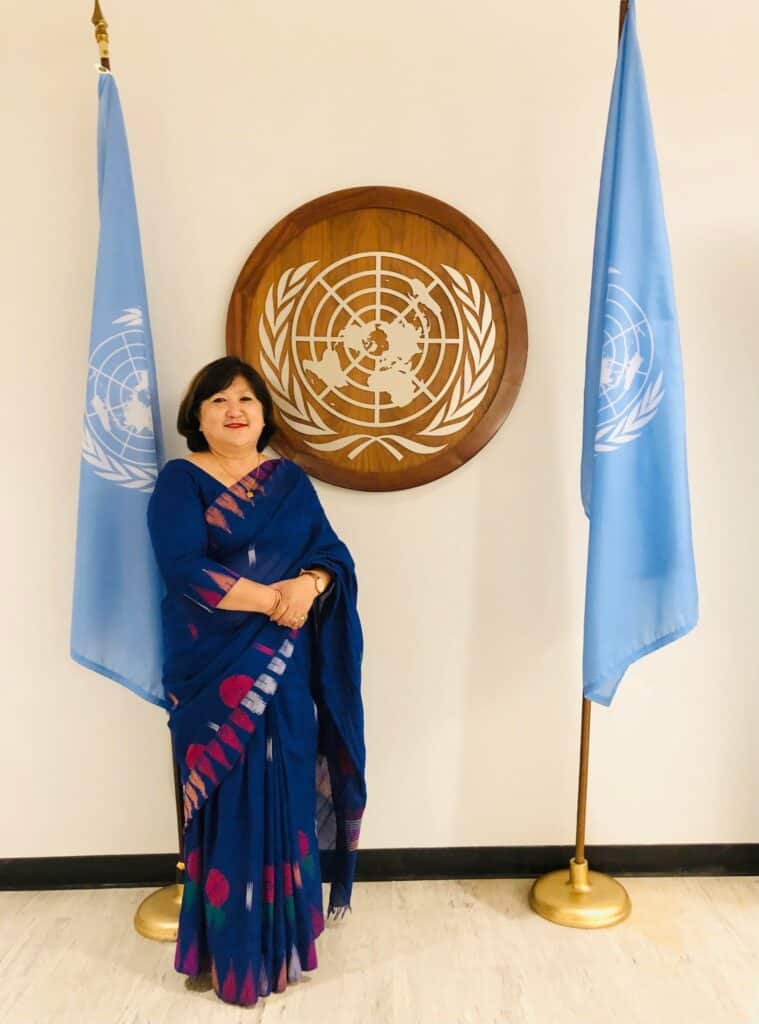
Bijaya Rai Shrestha is the Founder and Executive Director of Aaprabasi Mahila Kamdar Samuha (AMKAS) in Nepal. The literal English translation of AMKAS is The Returnee Women Migrant Workers’ Group. It is a pioneering Nepali civil society organisation that strives to promote and protect women migrant workers’ rights within Nepal and abroad through advocacy and campaigns.
The background of establishing AMKAS is tied with Bijaya’s personal experience of working as an undocumented migrant worker in Japan.
When she returned home to Nepal, she found a ban on Nepalese women migrant workers travelling to the Gulf. Before that decision, many Nepalese female migrant workers were abused horribly by their employers in the Gulf countries. However, that ban did not deter Nepalese women from migrating for work abroad. Instead, the ban forced many women to go around the ban, breaking the law and falling prey to human traffickers. Bijaya established AMKAS to build the capacity and knowledge of female migrant workers – so they could better claim and defend their rights – and to advocate for changes in policy.
In Nepal, the voices of the female migrant workers are still largely missing from the national policy discussion because most female migrant workers are uninformed about their rights.
“Some of us who know of our rights – and know of the violations of the rights of migrant workers came together to form AMKAS, so that we can make others know of their rights too for a safer and informed migration.”
Bijaya has very good memories from participating in a DTP/Migrant Forum in Asia (MFA) training program in Nepal to build the capacity of movement leaders.
“By participating in that training, I realized that international instruments are a useful tool for our advocacy. Now I always look to integrate international treaties and conventions into my work. I make others aware of international treaty bodies and how to use and communicate with UN special rapporteurs on migration and trafficking. Ratification of ILO Convention 189 at national level is now one of my biggest agenda as it protects the most vulnerable group – the migrant domestic workers.”
Bijaya said the DTP training enabled her to disseminate knowledge to her fellow advocates and Nepalese government agencies about the rights of migrant workers, it has also enabled her to conduct international campaigning and take concerns about Nepal’s migrant workers’ rights to a global audience.
“If I had not had DTP training, I would not know how to communicate, how to write and how to have meetings with the international actors as easily as I can do now. The training was also a great space for networking. Through that training, I have built a strong network with advocates of other countries, community organizations and UN organizations.”
Bijaya also said that she has seen significant shifts in government attitudes towards migrant workers because of NGO and migrant workers advocacy. When Bijaya began to work with the Nepalese government agencies, she found that, generally, a negative perception persisted towards female migrant workers, especially towards returning female migrant domestic workers. That mindset has changed to some extent– and policies have shifted as a result, although so much remains to be done.
DTP acknowledges the traditional custodians of the land on which we work, the Bedegal people of the Eora Nation. We recognise their lands were never ceded, and we acknowledge their struggles for recognition and rights and pay our respects to the Elders – past, present – and the youth who are working towards a brighter tomorrow. This continent always was and always will be Aboriginal land.
Aboriginal and Torres Strait Islander peoples should be aware that this website contains images or names of people who have passed away.
DTP acknowledges the traditional custodians of the land on which we work, the Bedegal people of the Eora Nation. We recognise their lands were never ceded, and we acknowledge their struggles for recognition and rights and pay our respects to the Elders – past, present – and the youth who are working towards a brighter tomorrow. This continent always was and always will be Aboriginal land.
Aboriginal and Torres Strait Islander peoples should be aware that this website contains images or names of people who have passed away.
Privacy Policy | Terms of Use | Disclaimer | Policies
© 2022 Diplomacy Training Program | ABN 31 003 925 148 | Web Design by Studio Clvr